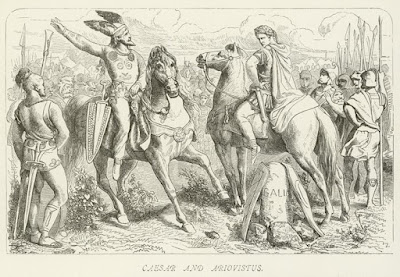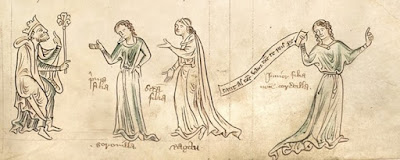Caesar, postquam suās cōpiās ex Ītaliā dūxit, Helvētiōs superāvit; inde Ariovistum, quī erat dux Germānōrum, trāns Rhēnum expulit; annō tertiō, postquam classem aedificāvit, nāvēs Gallōrum dēlēvit. Annō quārtō, quod Germānī auxilium ad Gallōs miserant et impetūs contrā gentēs Gallōrum semper faciēbant, Caesar pontem in Rhēnō fēcit. Caesar, postquam gentēs multās vīcit, oppida Germānōrum incendit et agrōs vastāvit. Interim Britannī classem mīserant et auxilium ad Belgās, quī bellum contrā Caesarem gerēbant. Itaque Caesar impetum contrā Britanniam parābat.
[1] Tense usage
Caesar, ¦ postquam suās cōpiās ex Ītaliā dūxit
[perfect], ¦ Helvētiōs superāvit. │ Caesar, after he had led [past
perfect] his troops out of Italy, conquered the Helvetii.
Annō tertiō, ¦ postquam classem aedificāvit
[perfect], ¦ nāvēs Gallōrum dēlēvit. │ In the third year, after he had built
[past perfect] a fleet, he destroyed the ships of the Gauls.
Caesar, ¦ postquam gentēs multās vīcit [perfect], ¦
oppida Germānōrum incendit …│ Caesar, after he had conquered
[past perfect] many tribes, set fire to the Germans’ towns…
[i] ubi; postquam: note again
that, in translation, English would tend to use the past perfect tense (had
done something) in the subordinate clause of time whereas Latin generally uses the
perfect (rather than the pluperfect) in constructions with ubi and postquam.
[ii] Look at how the three tenses
are working together in the same sentence.
[a] Annō quārtō, quod ¦ [ī]
Germānī auxilium ad Gallōs mīserant [pluperfect: an action that had
finished before the next past action began]¦ et impetūs contrā gentēs Gallōrum
semper [iī] faciēbant [imperfect: an action that was ongoing at that
point in the narrative], Caesar pontem in Rhēnō [iīī] fēcit [perfect: a
single, completed action in the past ].
In the fourth year, because [i]
the Germans had sent aid to the Gauls and [ii] were always
making attacks against the tribes of the Gauls [iii] Caesar built a
bridge on the Rhine.
[b] Caesar, …, oppida Germānōrum
incendit et agrōs vastāvit. Interim Britannī classem mīserant
[pluperfect] et auxilium ad Belgās, quī bellum contrā Caesarem gerēbant.
Caesar … set fire to the Germans’
towns and laid waste the fields. Meanwhile, the Britons had sent
a fleet and aid to the Belgae, who were waging war against Caesar.
[iii] Itaque Caesar impetum
contrā Britanniam parābat.
The imperfect tense can denote
the beginning of an action; in grammar this is known as inceptive. In
the context here, it would be an appropriate translation i.e. Caesar began
preparing an attack against Britannia because of what had been happening up to
that point:
Interim Britannī classem mīserant
et auxilium ad Belgās, quī bellum contrā Caesarem gerēbant. Itaque
Caesar impetum contrā Britanniam parābat.
Meanwhile the Britons had sent a
fleet and aid to the Belgae who were waging war against Caesar. Therefore,
Caesar began preparing an attack against Britain.
[2] Differences in English and
Latin word order
Caesar, ¦ postquam suās cōpiās ex
Ītaliā dūxit, │ Caesar, after he had led his troops out of Italy …
Caesar, ¦ postquam gentēs multās
vīcit, … │ Caesar, after he had
conquered many nations …
A more fluent rendering of the
sentences in English would be:
After Caesar had led
his troops out of Italy …
After Caesar had conquered
many nations …
Latin, however, likes to
keep the subject first at the beginning
of the sentence.
[3] ablative of time when
annus tertius > annō tertiō:
in the third year
annus quārtus > annō quārtō: in the fourth year
____________________
Caesar, after he had led his troops from Italy, overcame the Helvetii; thence he expelled Ariovistus, who was the leader of the Germans, across the Rhine; In the third year, after he had built a fleet, he destroyed the ships of the Gauls. In the fourth year, when the Germans had sent aid to the Gauls and were constantly making attacks against the tribes of the Gauls, Caesar built a bridge over the Rhine. Caesar, after he had defeated many nations, burned the towns of the Germans and laid waste the fields. Meanwhile the Britons had sent a fleet and aid to the Belgae, who were waging war against Caesar. Therefore, Caesar was preparing [began preparing] an attack against Britain.
____________________
https://en.wikipedia.org/wiki/Helvetii
Early 18th century map of Transalpine Gaul, the
location of the Helvetii to the right




















